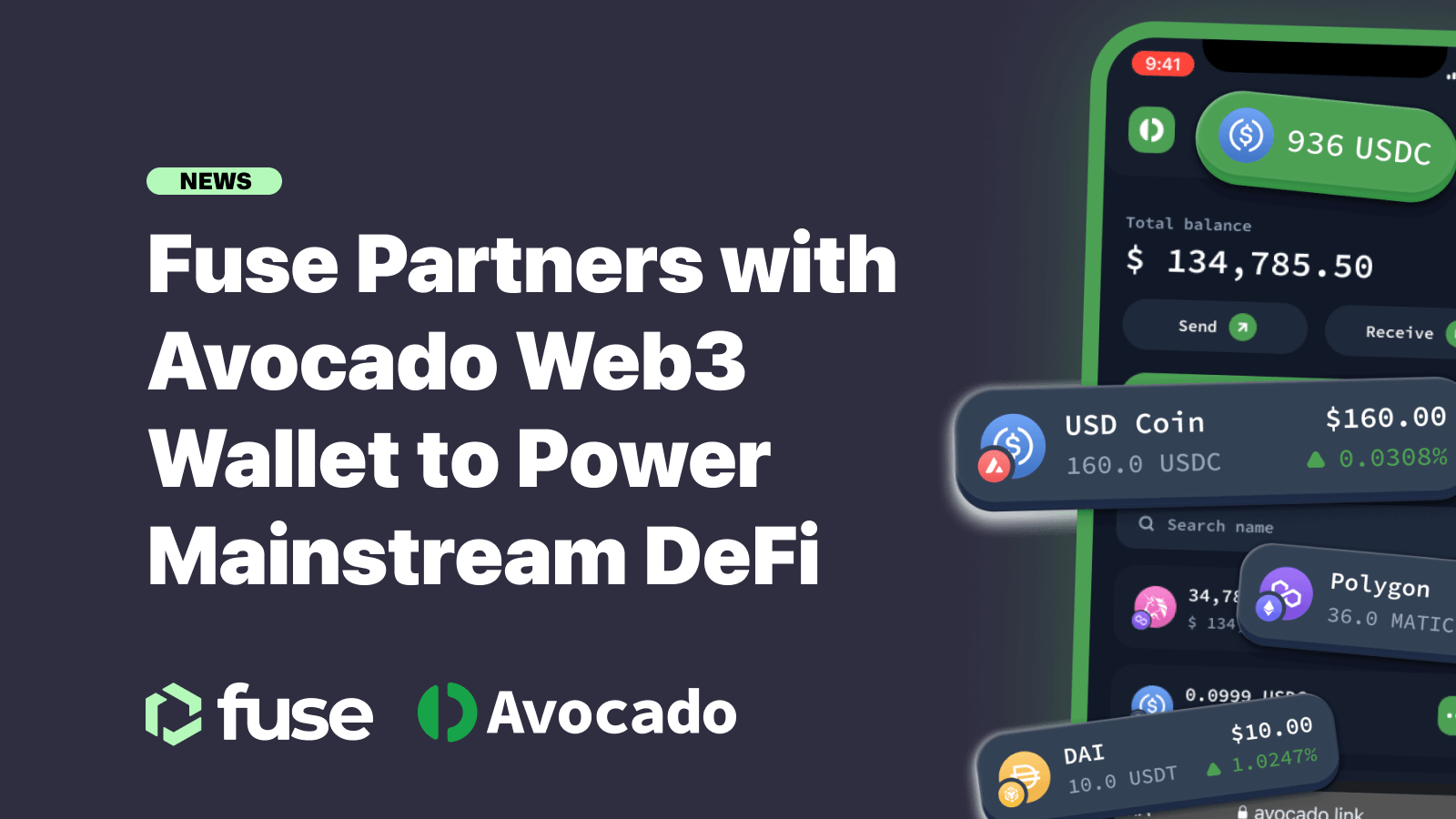We are delighted to announce an official partnership between Instadapp’s Avacado Web3 wallet and Fuse Network. Avocado is a self-custodial smart wallet with recovery features that simplify and secure Web3 interactions. Avocado integrates the Fuse Network and FUSE token.
Web3, with its blockchain-based infrastructure and decentralized applications, holds tremendous potential. However, it’s plagued by a linguistic barrier that can leave even the most tech-savvy individuals scratching their heads.
Imagine explaining Web3 to a friend who needs to send you a cross-border payment this weekend. They encounter terms like “gas,” “gwei,” “private key,” “seed phrase,” “public key,” “ERC-20,” “BEP-20,” “L1,” and “L2.” The most likely outcome is that you will never receive your payment.
Avocado by Instadapp is a self-custodial smart wallet offering users complete control over their private keys, enhancing security and minimizing third-party risks. It includes recovery features for regaining access in case of key loss or issues, adding convenience and security.
What you need to know about Avocado
Avocado simplifies Web3 interactions, making it easier and safer for users to engage with DeFi protocols and other web3 applications. Moreover, the product is designed to be user-friendly, catering to beginners and advanced users in the DeFi space. It supports token swaps, bridging, and more between over 10 EVM chains, including Fuse.

FUSE Network Assets: Avocado integrated the EVM-Compatible Fuse blockchain and FUSE token to enable seamless interaction, swaps, and bridging of FUSE assets with other supported chains.
Multi-Chain UX Improvement: Avocado Wallet aims to resolve multi-chain user experience (UX) challenges by abstracting the network complexity. Using the Avocado Wallet, users can interact with various DeFi protocols across chains without switching networks.
Gas Optimization: Avocado Wallet addresses gas cost issues, making it easier for users to get started in DeFi. It allows users to recharge their gas from any chain and even pay for gas using USDC, simplifying transaction expenses.
Account Abstraction: The wallet introduces account abstraction, simplifying the user experience. It allows users to execute various strategies, refinance positions, and interact with DeFi protocols seamlessly.
Getting Started Guide: Avocado provides guides and tutorials for end-users and developers who want to use or integrate Avocado into their projects. First-time users should consult the article ” How to deploy a wallet for first-time users.”

How Avocado Abstracts Blockchain Complexity
Avocado’s superpowers lie in its stripped-back and easy-to-use user interface, especially for those with little experience in blockchain transactions. Connecting your wallet to any dApp on any chain and performing a transaction with a few clicks is refreshing.
Of course, Avocado didn’t remove the blockchain complexities. They mask them and let users see only the most essential information. For example, when bridging assets using Avocado, users can choose to move specific tokens, like 1inch on Polygon, and perform a swap and bridge with one click to USDC on the Ethereum Network.
The Avocado Wallet aims to resolve multi-chain user experience (UX) challenges by abstracting the network complexity. Users can interact with various DeFi protocols across different chains without switching networks.
The DeFi Powerhouse: Avocado Web3 Wallet
Avocado Wallet is not just another wallet; it’s a Decentralized Wallet meticulously crafted on top of an ultra-secure foundation. Developed by the same visionary team behind Instadapp, a pioneer in DeFi with a remarkable track record spanning over four years, Avocado is a testament to their commitment to building cutting-edge, secure DeFi systems.
When you choose Avocado Web3 Wallet, you are not entrusting your funds to a third party. You retain complete control – “Not our keys, not our money.”
At the core of Avocado Wallet’s security is its unique architecture. It operates as a ‘Smart Contract Wallet,’ where each user wallet is a smart contract deployed across multiple blockchain networks, all with the same address. This design ensures the utmost security and transparency.
When you initiate a transaction, Avocado’s ‘Broadcasters’ (backend) swing into action, verifying your identity by checking your signature from your EOA (Metamask, etc.). This stringent verification process ensures that no unauthorized third party can execute transactions on your behalf.
Once verified, the Broadcasters forward the transaction details to your respective Smart Contract on the relevant blockchain. The Smart Contract then takes over, executing the transaction securely and efficiently. Throughout this process, multiple security checks are in place to guarantee end-to-end safety.
Emergency Access: Your Backdoor to Security
Even though the likelihood of an attack on Avocado’s Broadcasters is exceedingly low, Avocado Wallet’s decentralized nature ensures that you remain in control. In the unlikely event of such an incident, you can still access your Smart Contract directly through a ‘backdoor’ using Etherscan.
Avocado Wallet is the embodiment of DeFi’s core principle: Decentralization. Your assets are secure, and you retain control at all times. With Avocado, you have a wallet that safeguards your assets and empowers you with the tools to take charge of your financial destiny.
Experience the future of DeFi security with Avocado Wallet. Your assets, your control, your peace of mind.
Avocado Web3 Wallet: The Key to Adoption
Web3 wallets like Avocado simplify crypto and blockchain interactions, enhance security, and promote the principles of decentralization. Their compatibility with multiple blockchain networks and dApps makes them a critical component in expanding the adoption of crypto and blockchain technologies.
Web3 wallets with account abstraction, like Avocado, are a game changer because they revolutionize how transactions and smart contracts operate in the Web3 ecosystem. Account abstraction enables the creation of more versatile and flexible smart contracts by allowing them to control transactions and interact with external accounts directly. This simplifies the transaction process, making it more efficient and reducing the need for intermediaries, which can result in cost savings and faster transaction times.
Furthermore, account abstraction enhances security by reducing the risk of unauthorized access to funds, as smart contracts can manage their own transactions securely. This innovation is particularly significant for Web3 gaming on Fuse, providing gamers a secure and streamlined way to manage their assets within decentralized applications.
Account abstraction empowers smart contracts to handle transaction logic, making Web3 wallets more versatile, secure, and efficient. This transformative technology has the potential to unlock new possibilities and applications within the Web3 industry, making the onboarding of Avocado to Fuse a pivotal advancement for the network and broader Fuse community.
.svg)
.svg)












